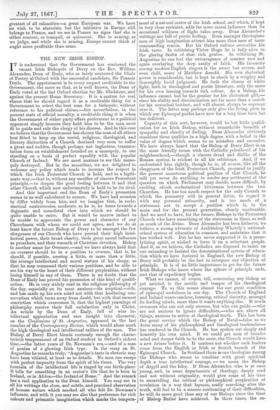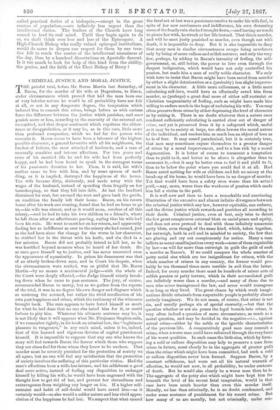THE NEW IRISH BISHOP.
IT is understood that the Government has conferred the vacant Irish Bishopric of Derry on the Rev. William Alexander, Dean of Emly, who so lately contested the Chair of Poetry at Oxford with the successful candidate, Sir Francis Doyle. The appointment is in every respect creditable to the Government, the more so that, as is well known, the Dean of Emly voted at the last Oxford election for Mr. Gladstone, and against the present Home Secretary. It is a matter for real shame that we should regard it as a creditable thing for a Government to select the best man for a bishopric, without reference to his political claims,—but nevertheless, in the present state of official morality, a creditable thing it is when the Government of either party offers preferment to a political opponent simply because they hold him to be the man most fit to guide and rule the clergy of his diocese. And in this case we believe thatthe Government has chosen the man of all others best fitted to keep up the moral, religious, theological, and literary distinction of a Church destined very soon to suffer a great and sudden, though perhaps not inglorious, transmu- tation from an establishment founded on a monopoly, to one standing on a basis of perfect equality with the popular Church of Ireland. We are most anxious to see this mono- poly destroyed. But in the meantime, we are delighted to welcome any policy which tends to increase the respect in which the Irish Protestant Church is held, and in a legiti- mate way,—that is, without any sacrifice of sincere Protestant principle,—to deepen the good feeling between it and that other Church which now unfortunately is held to be its rival.
And this important end the Dean of Emly's promotion seems to us well calculated to ensure. We have had occasion to differ widely from him, and we imagine that, in eccle- siastical controversies, moderate as he is, he leans towards a dogmatic and sacerdotal view into which we should be quite unable to enter. But it would be narrow indeed to be unable to appreciate the power and character of any Churchman with whom we could not agree, and we do at least know the future Bishop of Derry to be amongst the few clergymen of our Church who have proved their high intel- lectual power, their broad charity, their great moral influence as preachers, and their warmth of Christian devotion. Bishop is another name for Overseer,—and we have always held that an overseer should be in a position to oversee, that is, he should, if possible, overtop a little, or more than a little, the average intellectual and moral stature of his clergy, so that he may command their various positions, and be able to see his way to the heart of their different perplexities, without losing himself in any of them. There is no doubt that the Dean of Emly has proved his possession of this kind of qualifi- cation. He is very widely read in the religious philosophy of the day, especially on its most anxious—its sceptical—side, and has made up his own mind not with that hesitating con- servatism which turns away from doubt, but with that earnest conviction which overcomes it, that the highest yearnings of philosophy receive their full satisfaction only in Christ. An article by the Dean of Emly, full of wise in- tellectual appreciation and rare insight into character, on the Confessions of St. Augustine, appeared in the last number of the Contemporary Review, which would alone mark the high theological and intellectual calibre of the man. The Bishop of Derry Elect blends curiously enough the charac- teristic temperament of an Oxford student in Oxford's richest time,—the latter years of Dr. Newman's era,—and of a man of genius of a glowing Irish type. In the essay on St. Augustine he remarks truly, "Augustine's taste in rhetoric may have been vitiated, at least as to details. No man can escape with perfect impunity from the spirit of his times. The very fountain of the intellectual life is tinged by our birth-place. It tells for something in an orator's life that he is born in Ireland, or in Africa—the Ireland of Rome." And the remark has a real application to the Dean himself. You may see in all his writings the close, and subtle, and practised observation of human nature which marked all who felt Dr. Newman's influence, and with it you may see also that preference for rich colours and prismatic imagination which marks the tempera- ment of a natural orator of the Irish school, and which, if kept in very close restraint, adds far more moral influence than its occasional wildness of flight takes away. Dean Alexander's writings are full of poetic feeling. Even amongst theologians men of high imagination attract him more than men of mere commanding reason. But his Oxford culture over-rides his Irish taste. In criticizing Victor Hugo he is fully alive to the glaring faults of that rich genius. In criticizing St. Augustine he can feel the extravagance of manner now and again overlaying the deep sanity of faith. His favourite among modern English singers is the sweet but severe, and even chill, muse of Matthew Arnold. His own rhetorical power is considerable, but is kept in check by a weighty and thoroughly lucid judgment. He feels the charm of white light, both in theological and poetic literature, only the more for his own leaning towards rich colour. As a bishop, his influence cannot but be the greater for his rhetorical gift,— since his ability and discrimination are far more than a match for his oratorical instinct, and will almost always be supreme over it. The latter may perhaps only give the living glow in which our Episcopal guides have now for a long time been but too deficient.
Capacity of this sort, however, would be but little qualifi- cation for an Irish Bishop, without remarkable breadth of sympathy and charity of feeling. Death Alexander obviously combines these qualities in a high degree with a belief in the value of dogma which seems to us mistaken and excessive. We have always heard that the Bishop of Derry Elect is on the most friendly terms with the Catholic, priesthood of his neighbourhood,—though a sincere dread awl dislike of the Roman system is evident in all his criticisms. And, if we understand him rightly, though he is, of course, like all the clergymen of the Irish Protestant Church, prepared to justify the present monstrous political position of that Church, he will yet never do anything to render any settlement of the- question on which Parliament may decide, more difficult, by exciting afresh ecclesiastical bitterness between the two Churches. He has too much respect for the only Church to which the peasantry will in general listen, to regard it with any personal animosity, and is too much of a statesman not to accept a position which is, in the main and for the present generation, clearly unalterable. And we need to have, for the future, Bishops in the Protestant Church who have something of the statesman in them, as well as much of the divine. Dean Alexander has been hitherto, we believe, a strong advocate of Archbishop Whately's national- school system of education in common, and maintains that it has worked well. But he has never supported it in a prose- lytizing spirit, or wished to force it on a reluctant people. And if, as we believe, the Catholics are disposed to insist on our extending to Ireland the denominational system of educa- tion which we have fostered in England, the new Bishop of Derry will probably be the last to interpose any objection of principle. It is of no little importance to get for the future Irish Bishops who know where the sphere of principle ends,_ and that of expediency begins.
What we cannot, of course, tell, concerning any bishop as yet untried, is the mettle and temper of his theological courage. To us this seems almost the one great condition of episcopal usefulness in our day. The Church of England and Ireland wants candour, learning, critical sincerity, amongst its leading minds, more than it wants anything else. It needs overseers who can not only oversee, but who can guide,—who are not anxious to ignore difficulties,—who are, above all things, anxious to arrive at theological truth. This has been the great service which the Bishop of Natal—false as we deem many of his philosophical and theological tendencies— has rendered to the Church. He has spoken out simply and honestly his own mind. If we could get men of broader mind and deeper faith to do the same, the Church would have a new future before it. It matters not whether such leaders come from the English or Irish or Scotch branch of the Episcopal Church. In Scotland there is one theologian among the Bishops who seems to combine with great spiritual depth a true intellectual courage, — we mean the Bishop of Argyll and the Isles. If Dean Alexander, who is at once young, and, in some departments of theology, deeply read and not without originality, would give some of his time to unravelling the critical or philosophical perplexities of revelation in a way that laymen, really searching after the truth, will feel to be a sincere confronting of their difficulties, he will do more good than any of our Bishops since the time of Bishop Butler have achieved. In these times, the so- called practical duties of a bishopric,—except in the great centres of population,—are infinitely less urgent than the intellectual duties. The leaders of the Church have long ceased to lead its real mind. Until they begin again to do so, we shall think ever less and less of the Episcopate. A High-Church Bishop who really valued episcopal institutions, would do more to deepen our respect for them by one trea- tise felt to reach the centre of the intellectual uneasiness of the day, than by a hundred dissertations on Apostolic descent. Is it too much to look for help of this kind from the ability, the genius, and the faith of the Elect Bishop of Derry ?































 Previous page
Previous page